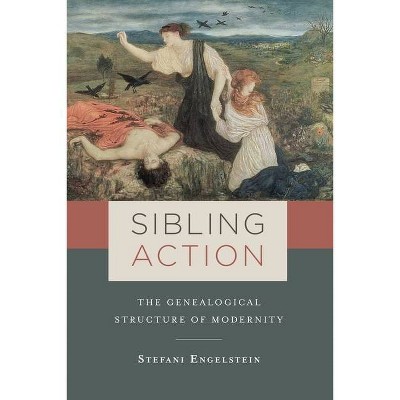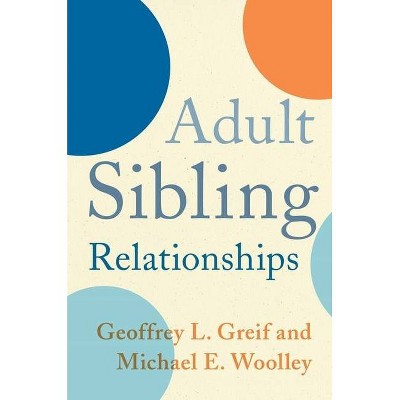Sibling Action - by Stefani Engelstein (Hardcover)

Similar Products
Products of same category from the store
AllProduct info
<p/><br></br><p><b> About the Book </b></p></br></br>Stefani Engelstein argues that the sibling paradigm shaped the modern subject, life sciences, human sciences, and collective identities such as race, religion, and gender. Integrating close readings with panoramic intellectual history, <i>Sibling Action </i>presents a compelling new understanding of systems of knowledge.<p/><br></br><p><b> Book Synopsis </b></p></br></br>The sibling stands out as a ubiquitous--yet unacknowledged--conceptual touchstone across the European long nineteenth century. Beginning in the late eighteenth century, Europeans embarked on a new way of classifying the world, devising genealogies that determined degrees of relatedness by tracing heritage through common ancestry. This methodology organized historical systems into family trees in a wide array of new disciplines, transforming into siblings the closest contemporaneous terms on trees of languages, religions, races, nations, species, or individuals. In literature, a sudden proliferation of siblings--often incestuously inclined--negotiated this confluence of knowledge and identity. In all genealogical systems the sibling term, not quite same and not quite other, serves as an active fault line, necessary for and yet continuously destabilizing definition and classification. <p/>In her provocative book, Stefani Engelstein argues that this pervasive relational paradigm shaped the modern subject, life sciences, human sciences, and collective identities such as race, religion, and gender. The insecurity inherent to the sibling structure renders the systems it underwrites fluid. It therefore offers dynamic potential, but also provokes counterreactions such as isolationist theories of subjectivity, the political exclusion of sisters from fraternal equality, the tyranny of intertwined economic and kinship theories, conflicts over natural kinds and evolutionary speciation, and invidious anthropological and philological classifications of Islam and Judaism. Integrating close readings across the disciplines with panoramic intellectual history and arresting literary interpretations, <i>Sibling Action </i>presents a compelling new understanding of systems of knowledge and provides the foundation for less confrontational formulations of belonging, identity, and agency.<p/><br></br><p><b> Review Quotes </b></p></br></br><br>Appealing and intellectually exciting.--Monatshefte<br><br>A provocative and elegant study that deserves the attention of every historian of nineteenth-century science.--Isis<br><br>Wide-ranging and intriguing.--Choice<br><br>This ambitious, powerful, and highly original study examines the figure of the sibling as a major anchoring device of the epistemological and political systems of modernity--a figure that not only relays the great shift from a vertical model of sovereignty to a horizontal one of <i>fraternité</i> but also causes trouble for the various systems it underwrites by transforming dichotomies into more open relational structures. At the same time, Engelstein interrogates the gender politics of this master trope by way of the figure of the sister, whose role in the new citizenship model that emerged from the French Revolution was to provide a locus of stable affective bonding, while being excluded from the public sphere. Through incisive readings of texts by Sophocles, Schiller, Rousseau, Lessing, Goethe, Shelley, Byron, and George Eliot, among others, Engelstein open up archives in a new way and adds her eloquent voice to the ongoing discussion of cosmopolitanism and participatory democracy.--Marc Redfield, author of <i>Theory at Yale: The Strange Case of Deconstruction in America</i><br><br>As inviting, invigorating, and stimulating an academic book as I have encountered. An astonishing read from the first page to the last.--Adrian Daub, Stanford University<br><br>In an utterly original way, Engelstein reveals how the figure of the sibling--not quite self and not quite other--has shaped Western understandings of biology, language, and politics. Through deft analysis, she uncovers an epistemological move that since the late eighteenth century has been destabilizing quests for origins and descriptions of unique, historically grounded individuals: a lateral rather than a vertical comparison that blurs boundaries by claiming both affinity and difference.--Laura Otis, author of <i>Rethinking Thought: Inside the Minds of Creative Scientists and Artists</i><br><br>The scope, complexity, and importance of <i>Sibling Action</i> is extraordinary: working fluently and fluidly across German, French, and British eighteenth- and nineteenth-century literatures and sciences, as well as ancient Greek tragedy and its modern interpretations, Engelstein establishes convincingly that the sibling is a key "boundary object" by means of which many of our modern disciplines, as well as the very notion of disciplinarity, have established themselves. <i>Sibling Action</i> is an enormous contribution not only to German and British literary studies, but also to science studies and contemporary feminist theory, and is certain to be a key reference in all of those fields for a long time to come.--Robert Mitchell, author of <i>Experimental Life: Vitalism in Romantic Science and Literature</i><br><p/><br></br><p><b> About the Author </b></p></br></br>Stefani Engelstein is associate professor and chair of the department of Germanic languages and literature at Duke University. She is the author of <i>Anxious Anatomy: The Conception of the Human Form in Literary and Naturalist Discourse</i> (2008) and coeditor of <i>Contemplating Violence: Critical Studies in Modern German Culture </i>(2011).
Price History
Cheapest price in the interval: 75 on November 8, 2021
Most expensive price in the interval: 75 on December 20, 2021
Price Archive shows prices from various stores, lets you see history and find the cheapest. There is no actual sale on the website. For all support, inquiry and suggestion messagescommunication@pricearchive.us




















